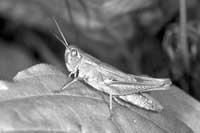Volatile weapons against herbivores

When attacked by herbivores, plants produce volatile organic substances to attract predators or parasites from these herbivores. Given this behavior, scientists try to find a method to control insect pests. The first option is to add these volatile substances segregated by plants, or to reduce the threshold (in this case the level of plague) that plants need to produce this substance. The second option is to look for plants with greater resistance to herbivores and greater attraction capacity of the predators of these herbivores.
The third is the use of enzymes that increase the release of volatile substances. However, since the genes associated with the production of volatile substances are practically unknown, the genes of the Arabidopsis plant are being studied, so that the results of this study also serve other crops. Moreover, according to Dutch researcher Marcel Dicke of Wagening University, the best option is to use molecular markers along with traditional plant cultivation. This would prevent the debate on gene change.





